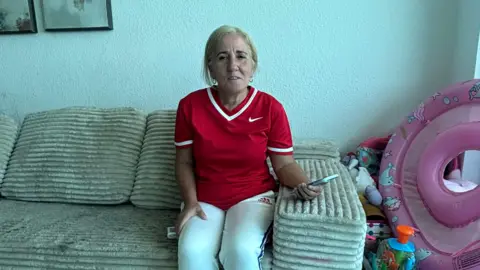Life inside notorious Alligator Alcatraz in its final days
When her son was taken into immigration custody, Yaneisy Fernandez feared the worst. Then she got a call from him inside Alligator Alcatraz.
We had no idea where he was until he called us, Yaneisy told the BBC. He said, 'mom, they took me to the facility of the crocodiles.' This temporary immigration detention center, built in Florida's Everglades, has quickly become a polarizing symbol of President Donald Trump's immigration policy.
Now, just two months after it opened, the Department of Homeland Security (DHS) announced plans to shut it down, complying with a judge's orders. The process is underway, as border officials state that only about 50% of the detainees remain.
The BBC recently spoke to families of detainees, who reported distressing conditions inside. One mother's son was left bleeding after a medical incident, leading to an ongoing lawsuit alleging that detainees are denied in-person access to their lawyers.
'The facility of the crocodiles'
Constructed in late June, Alligator Alcatraz was created to house about 3,000 people but never reached full capacity. During its operation, it became a focal point for debates regarding immigration enforcement, with visitors protesting and others taking selfies with the facility's sign.
Conflicting reports surfaced regarding conditions inside; while some politicians praised it as a well-run facility, others described it as overcrowded and unsanitary. A judge's recent injunction mandates its closure within 60 days amid claims of governmental procedural failures during construction.
'They left him there like a dog'
Michael Fernandez, who moved to the US from Cuba, was detained after a series of legal issues, during which he developed severe medical conditions and severe pain due to untreated health issues.
Yaneisy expressed her distress, stating that her son was not provided adequate medical attention or hygiene, feeling they treated him worse than an animal.
A week without news
Similar worries emerged from other detainees’ families, such as Gladys, who gained insight into her husband Marco's severe health struggles after a week of silence.
Marco, with a pre-existing heart condition, was taken without justification, and his situation raised concerns about the access and visibility of detainees' health records and conditions.
As the shutdown of Alligator Alcatraz nears completion, this facility has starkly highlighted the evolving landscape of immigration enforcement and the consequences for individuals entangled within it. Current efforts show that while this detention center is being dismantled, similar facilities are being established elsewhere, indicating the ongoing nature of the immigration discourse in America.





















